Army Staff Sgt. Aidan McNulty writes down a patient’s information during a medical clinic to serve the local population in Bobo-Dioulasso, Burkina Faso, Feb. 19, 2021.
Providing up-to-date information, news and original content on American Military issues.
Army Staff Sgt. Aidan McNulty writes down a patient’s information during a medical clinic to serve the local population in Bobo-Dioulasso, Burkina Faso, Feb. 19, 2021.
Army Spc. Abner Torres assists a patient after administering a COVID-19 vaccine at the Puerto Rico National Guard’s vaccination center in Caguas, Puerto Rico, March 1, 2021. Torres and other guardsmen at the center are wearing powered air-purifying respirators, which are face masks that have an air filtration system to promote better airflow.
Navy Petty Officer 2nd Class Orbie VanCurine, assigned to the Combat Logistics Battalion 22, Camp Lejeune, N.C., prepares a COVID-19 vaccine during the opening of the state-run, federally-supported Center City Community Vaccination Center at the Pennsylvania Convention Center in Philadelphia, March 3, 2021.
Kimberly Leonard, deputy director for narcotic enforcement, assigned to the New York State Department of Health, oversees the safe handling and storage of the first doses of the Johnson and Johnson vaccine at the Javits Convention Center in Manhattan, N.Y., March 3, 2021. The National Guard has hundreds of guardsmen deployed to help staff the vaccination site.
March 5, 2021 | BY David Vergun , DOD News
A Defense Department official described China's rapid success in advancing highly capable new technologies for its military, just as DOD's own modernization efforts are hampered by budgetary restraints.
Michael Brown, the director of the Defense Innovation Unit, spoke today at a virtual Hudson Institute panel discussion on "Competing with China through Budget Agility."
Brown said the Chinese are often portrayed as being skilled at copying Western technology.
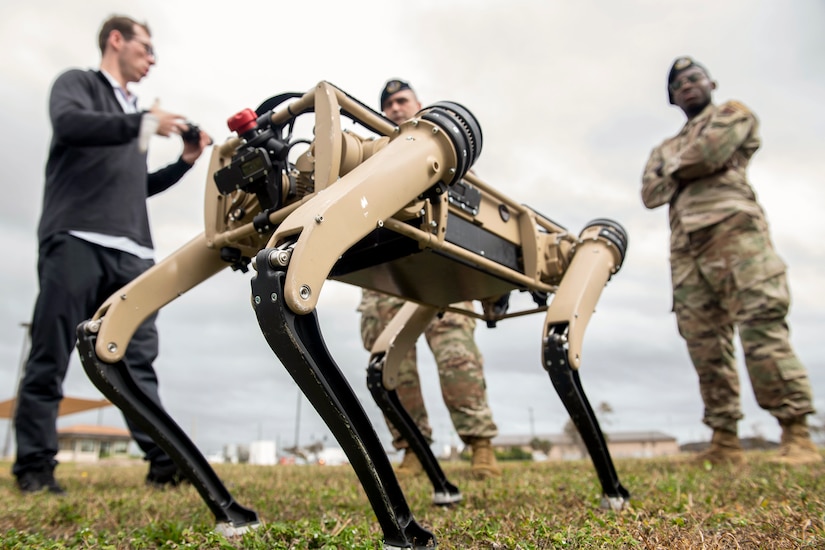
They have 500 investing entities that mirror Western ways of raising capital, he said. They do venture capital, growth capital and private equity for example, just like the U.S. does. And, they're trying to mirror what the U.S. has done with research, creating research parks, co-locating people and having startup investments.
Having said that, the Chinese are incredibly innovative, Brown said.
They're doing a good job of bringing government, business and academia together, just like the U.S. did with the Manhattan Project and the Apollo Program and they're building a very successful commercial economy, Brown said, offering some examples.

One of the satellites they launched in 2016, uses quantum science for secure communications. They're using artificial intelligence in some of their weapons platforms. For instance, they now have anti-ship ballistic missiles that incorporate AI so that they can effectively evade countermeasures. They also have effective cyber capabilities and they lead the world in small drone production, he said.
"The [People's Liberation Army] is not magical. There [are] inefficiencies in their bureaucracy, just like there are in ours. But they're very focused and thinking about the long term. So I think it's a mistake for us to dismiss their innovative capability," Brown said.

Technology is at the heart of the great power competition with China, he said. "That tech race implies speed. We need to be moving at a rate of speed that ensures we're not getting behind. There's a first-mover advantage for these new technologies, both the adoption and production of those."
Brown said China is beginning to take the lead in new technologies like 5G, AI, biotechnology and autonomous systems because their system allows them to move big and to move fast.
The department has a budget cycle that requires years, from requirements to production. Brown said the department should have much shorter timelines like the private sector.

Besides moving faster, the department needs more flexibility in how it spends the money. For example, Brown noted that DOD funds are placed in a variety of pots and it's illegal to take money from one pot and move it to another one, even when an urgent need arises. Another example is the "use it or lose it" rule, that money has to be spent on a program and if it's not, that program will not receive funding in subsequent years.
"It's a completely mismatched system for what the competition with China calls for," Brown said. "You can learn a lot by adapting to what the private sector has already perfected."
Sailors assigned to Maritime Expeditionary Security Squadron 11 participate in evaluation exercises aboard a patrol boat in San Diego, Feb. 24, 2021.
March 5, 2021 | BY Terri Moon Cronk , DOD News
Secretary of Defense Lloyd J. Austin III has announced his top three priorities for the Defense Department: to develop the right people, priorities and purpose of mission. According to a memorandum from his office, the mission is to continue to defend the nation from enemies, foreign and domestic.
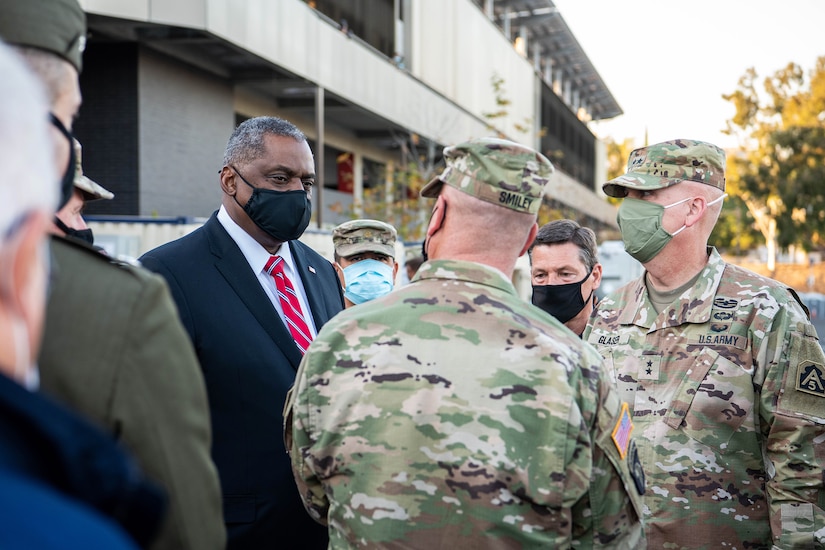
"This will require aligning our priorities and capabilities to a changing and dynamic threat landscape," the secretary said in the memo. "We will do so in a way that is based on a sober assessment of our strategic needs and recognize the importance of building and sustaining a strong workforce and unity within our department, across the nation and with our allies and partners around the world."
Austin's three priorities — defending the nation, taking care of our people and succeeding through teamwork — will guide our efforts, he emphasized. Following are the priorities under his leadership:
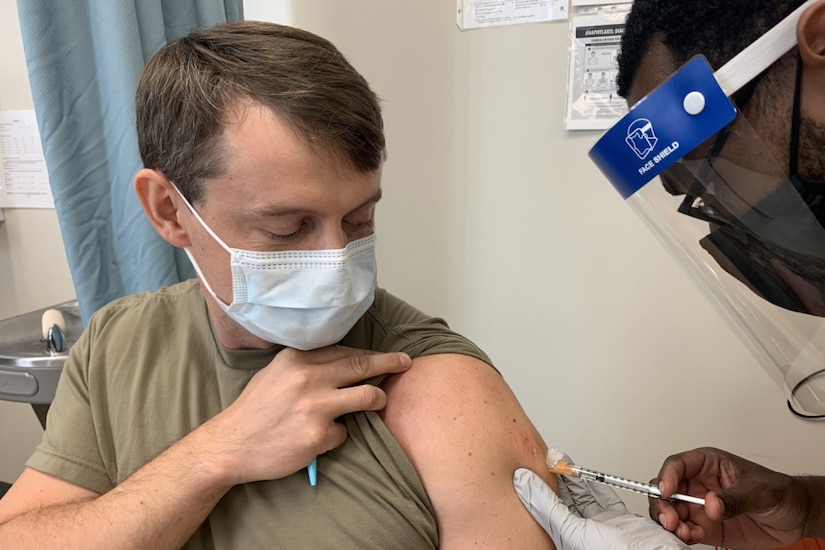
DEFEND THE NATION
TAKE CARE OF OUR PEOPLE
SUCCEED THROUGH TEAMWORK
"As I said in my confirmation hearing, we need resources matched to strategy, strategy matched to policy, and policy matched to the will of the American people," Austin said, adding that focusing on his priorities will help us develop policy, fashion strategy, and acquire resources.
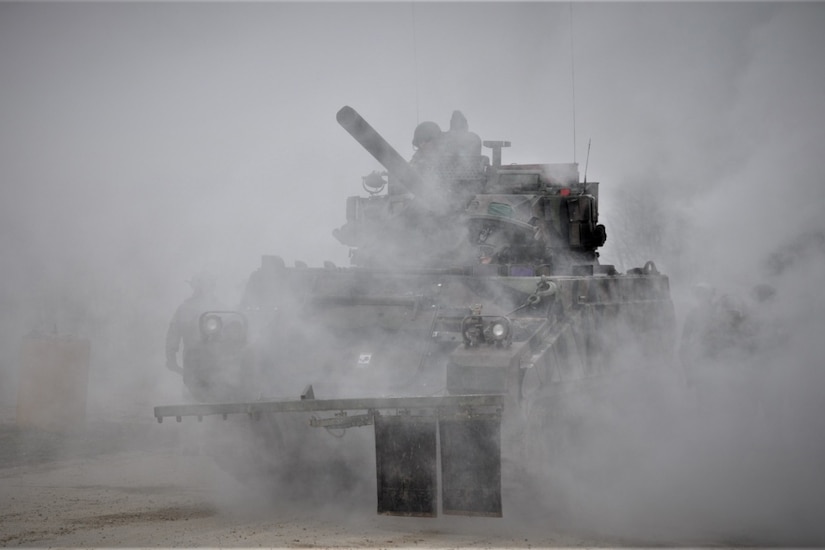
"I hope you will consider how you can assist in that effort," the secretary said. "Thank you for your service to our country and for your commitment to our national security. I look forward to working with each one of you as we build a department ready to meet the challenges of tomorrow, together."
Army Master Sgt. Jennifer Freeman, a North Dakota National Guardsman, takes aim at range targets during the Chief National Guard Bureau Biathlon Championships at the Camp Ripley Training Center, Minn., Feb. 24, 2021.
WASHINGTON – Two Texas construction company owners have pleaded guilty in a long-running scheme to defraud the United States.
Michael Wibracht of San Antonio, Texas, the former owner of several companies in the construction industry, conspired to defraud the United States in order to obtain valuable government contracts under programs administered by the U.S. Small Business Administration (SBA) for which neither his nor his co-conspirators’ companies were eligible. One co-conspirator, Ruben Villarreal, also of San Antonio, pleaded guilty on Nov. 20, 2020, to participating in the same conspiracy.
“For many years, this conspiracy undermined the integrity of the federal procurement process,” said Acting Assistant Attorney General Richard A. Powers of the Department of Justice Antitrust Division. “This conduct robbed opportunities from honest businesses, especially those owned by historically disadvantaged individuals and service-disabled veterans.”
According to court documents filed in the Western District of Texas in San Antonio, Wibracht, Villareal, and other co-conspirators conspired to defraud the United States by interfering with the function of the SBA and fraudulently obtaining money from agencies of the United States as early as 2004 continuing at least through 2017. As part of this scheme, the conspirators installed Villareal, a service-disabled veteran, as the ostensible owner of a general construction company held out as a Service-Disabled Veteran-Owned Small Business (SDVOSB). Wibracht and other co-conspirators, however, exercised disqualifying financial and operational control over the construction company. The conspirators concealed that control in order to secure over $250 million in government contracts that were “set aside” for SDVOSBs in order to benefit their larger, non-qualifying businesses. The SBA administers the SDVOSB program, which is designed to increase the number of government contracts awarded to small businesses owned and controlled by service-disabled veterans. To qualify as an SDVOSB, a company, among other things, must be owned and controlled by a service-disabled veteran.
“Conspiring to fraudulently gain access to federal contracts set aside for small businesses owned and operated by disadvantaged individuals or service-disabled veterans is unacceptable,” said Inspector General Hannibal “Mike” Ware. “The guilty pleas send a strong message that those responsible will be held accountable. I want to thank the Antitrust Division and our law enforcement partners for their support and dedication to pursuing justice in this case.”
“These plea agreements showcase the unique expertise of the U.S. Army CID’s specialized unit, the Major Procurement Fraud Unit,” said Special Agent in Charge Ray A. Rayos of the Southwest Fraud Field Office of the U.S. Army Criminal Investigation Command’s Major Procurement Fraud Unit. “Together, with our partner agencies and the Department of Justice Antitrust Division, those individuals responsible for engaging in a complex and long running scheme to defraud the United States government have been brought to justice.”
“The General Services Administration Office of Inspector General is committed to working with its law enforcement partners and the Department of Justice Antitrust Division to ensure that individuals and companies who fraudulently obtain contracts meant for legitimate small and disadvantaged businesses are investigated and prosecuted to the full extent of the law,” said Inspector General Carol Ochoa of the General Services Administration.
“This outcome is a testament to the commitment of the Defense Criminal Investigative Service (DCIS) and our Law Enforcement partners in safeguarding the integrity to the DoD contracting process,” said Acting Special Agent-in-Charge Gregory P. Shilling of the DCIS Southwest Field Office. “DCIS will utilize all available resources to pursue allegations of fraud and corruption, bringing to justice those who seek to enrich themselves through the exploitation of Small Business Administration programs designed to help disadvantaged groups.”
Wibracht pleaded guilty to one count of conspiring to commit wire fraud and defraud the United States. Villarreal pleaded guilty to conspiracy to defraud the United States and is scheduled to be sentenced before Judge Xavier Rodriguez on June 23, 2021. Both men face a maximum penalty of five years in prison and a $250,000 fine. The maximum fine for an individual may be increased to twice the gain derived from the crime, or twice the loss suffered by victims of the crime, if either of those amounts is greater than the statutory maximum fine. A federal district court judge will determine any sentence after considering the U.S. Sentencing Guidelines and other statutory factors.
The SBA Office of Inspector General, Army Criminal Investigation Command’s Major Procurement Fraud Unit, General Services Administration Office of Inspector General, Department of Veterans Affairs Office of Inspector General, and DCIS are investigating the case, with assistance from the U.S. Attorney’s Office for the Western District of Texas and the Army Audit Agency.
The Department of Justice Antitrust Division’s Washington Criminal II Section is prosecuting the case. Special thanks are extended to Assistant U.S. Attorney William F. Lewis, Jr. of the U.S. Attorney’s Office for the Western District of Texas.
Anyone with information in connection with this investigation is urged to call the Antitrust Division’s Washington Criminal II Section at 202-598-4000, or visit https://www.justice.gov/atr/contact/newcase.html.
In November 2019, the Department of Justice created the Procurement Collusion Strike Force, a joint law enforcement effort to combat antitrust crimes and related fraudulent schemes that impact procurement and grant and program funding at all levels of government — Federal, state, and local. For more information, visit https://www.justice.gov/procurement-collusion-strike-force.
A U.S. Army Special Forces soldier and a Guatemalan special forces member prepare a sniping position before a training exercise in Guatemala, March 3, 2020.
An Air Force KC-135 Stratotanker aircraft pilot and crew chief perform a preflight walk around the aircraft before an air-refueling mission at Al Udeid Air Base, Qatar, Feb. 16, 2021.
March 5, 2021 | BY Vivian Mason
When a vaccine is limited, how do you decide who should get vaccinated first? That was the question Dr. Laura Gilbert, a Master of Public Health graduate student at the Uniformed Services University, faced when a unique opportunity to help a local military retirement community with their COVID-19 immunization plan presented itself.
Gilbert, a Navy lieutenant commander and infectious disease fellow at Walter Reed National Medical Center, Bethesda, Maryland, jumped at the chance to assist. She had previously seen patients from the Knollwood Life Plan Community and enjoyed working with them. The opportunity also involved working with an infectious disease, so it was right up her alley.
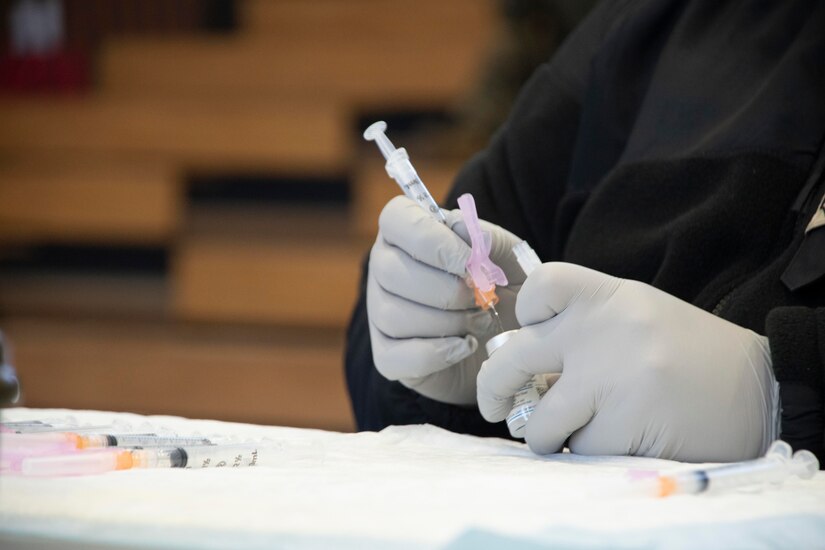
Knollwood is nestled in Rock Creek Park in Washington, D.C., about 20 minutes away from the university, and houses uniformed service members and their families. The retirement center reached out to the university leadership to suggest a potential opportunity for a study project, developing their immunization plan.
Gilbert set out to tackle this endeavor. She quickly realized that, initially, there wasn't much guidance on how to prioritize and distribute the recently-developed vaccine among the residents and staff. There was also a limited supply, so it became even more important to prioritize who would get the vaccine first. She consulted her mentor, U.S. Public Health Service Capt. (Dr.) Darrell Singer, an associate professor and director of USU's MPH degree program, and immediately began collaborating with Knollwood's health administration team. Gilbert not only had to consider the residents, but also essential workers who were keeping the center running smoothly, such as housekeeping, food workers, grounds keepers and social workers.
"I took a tour of Knollwood, evaluated the number of residents and staff onsite, reviewed published recommendations and guidelines, assessed clinical trials, considered logistics and expectations, conferred with my advisor, and then outlined my recommendations and compiled a proposed plan on how they could safely and efficiently distribute the COVID-19 vaccine for their residents and staff," Gilbert explained.
Experts have reported it's critical to vaccinate those who regularly work around individuals most at risk for COVID-19.

"I think a lot of what I did was guiding their team," she said. "Knollwood had an idea of how to proceed, but I just helped them navigate the situation. Then, I formulated a document based on what I would recommend for their community."
Before rolling out the vaccine administration plan, Gilbert and the Knollwood team had conversations about how to monitor vaccines and patients, after receiving it.
"I worked with the nurses to help them devise a plan of what was reasonable for their community on vaccination day," she added.
Eventually, all of those efforts culminated with Knollwood's COVID-19 Vaccine Clinic Day. Residents couldn’t wait to roll up their sleeves to get vaccinated.
"Knollwood actually had two clinic days where, with the help from local drug store pharmacy technicians, they were able to offer the Moderna vaccine to almost 600 residents and employees," Gilbert said. "The pharmacy techs had a great setup that was very efficient and very organized. The Knollwood team also did an excellent job of communicating with all the residents and staff, and consent was obtained ahead of time from all participants."
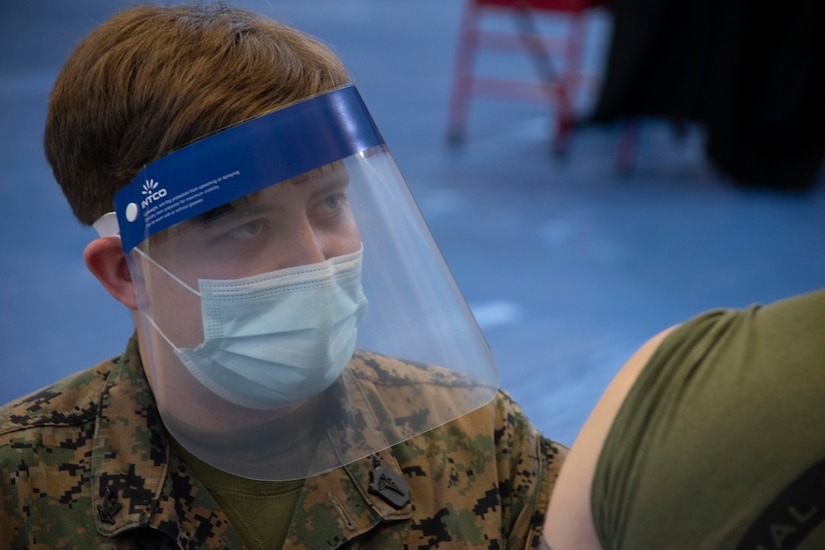
After receiving the vaccine, participants had to wait 15 minutes to make sure they didn't have any adverse reactions. "This is one step closer to regaining a normal life, marveled one Knollwood resident.
Family members of the retirement community residents had a lot of concerns about the vaccine. Gilbert conducted a webinar that addressed their questions and helped increase communication between the staff, residents and family members.
"I liked the format of the webinar," Gilbert said. "It was conducted like a conversation, somewhat akin to a fireside chat."
Gilbert added that there was a general air of hope and excitement during the vaccine clinic.
"Participants knew what to expect, so they were ready," she said.
For Gilbert, this practicum was an incredible experience.
"It was a privilege working with the Knollwood community," Gilbert said. "I'm really grateful to Dr. Singer, my incredibly supportive advisor. He married my interests with my background of infectious diseases, public health and the military. I learned a lot along the way, and I love serving. That's why I became a doctor."
March 5, 2021
Secretary of Defense Lloyd J. Austin III announced today that the president has made the following nominations:
Air Force Brig. Gen. John M. Breazeale has been nominated to the grade of major general. Breazeale is currently serving as the mobilization assistant to the commander, Headquarters Air Combat Command, Joint Base Langley-Eustis, Virginia.
Air Force Brig. Gen. Matthew J. Burger has been nominated to the grade of major general. Burger is currently serving as the deputy commander, Headquarters Air Force Reserve Command, Robins Air Force Base, Georgia.
Air Force Brig. Gen. Kenneth R. Council has been nominated to the grade of major general. Council is currently serving as the mobilization assistant to the commander, U.S. Transportation Command; and commander, Joint Transportation Reserve Unit, U.S. Transportation Command, Scott Air Force Base, Illinois.
Air Force Brig. Gen. Daniel J. Heires has been nominated to the grade of major general. Heires is currently serving as the mobilization assistant to the commander, 7th Air Force, Pacific Air Forces, Osan Air Base, South Korea.
Air Force Brig. Gen. Erich C. Novak has been nominated to the grade of major general. Novak is currently serving as the mobilization assistant to the commander, Headquarters Air Force Global Strike Command, Barksdale Air Force Base, Louisiana.
Air Force Brig. Gen. Jeffrey T. Pennington has been nominated to the grade of major general. Pennington is currently serving as the commander, 4th Air Force, Air Force Reserve Command, March Air Reserve Base, California.
Air Force Brig. Gen. John N. Tree has been nominated to the grade of major general. Tree is currently serving as the mobilization assistant to the chief of staff, U.S. Air Force, Pentagon, Washington, D.C.
Air Force Brig. Gen. Constance M. Von Hoffman has been nominated to the grade of major general. Von Hoffman is currently serving as the mobilization assistant to the commander, Air Force Sustainment Center, Air Force Materiel Command, Tinker Air Force Base, Oklahoma.